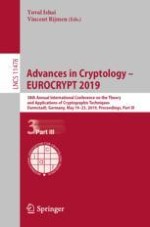2019 | OriginalPaper | Chapter
Verifier-on-a-Leash: New Schemes for Verifiable Delegated Quantum Computation, with Quasilinear Resources
Authors : Andrea Coladangelo, Alex B. Grilo, Stacey Jeffery, Thomas Vidick
Published in: Advances in Cryptology – EUROCRYPT 2019
Publisher: Springer International Publishing
Activate our intelligent search to find suitable subject content or patents.
Select sections of text to find matching patents with Artificial Intelligence. powered by
Select sections of text to find additional relevant content using AI-assisted search. powered by
